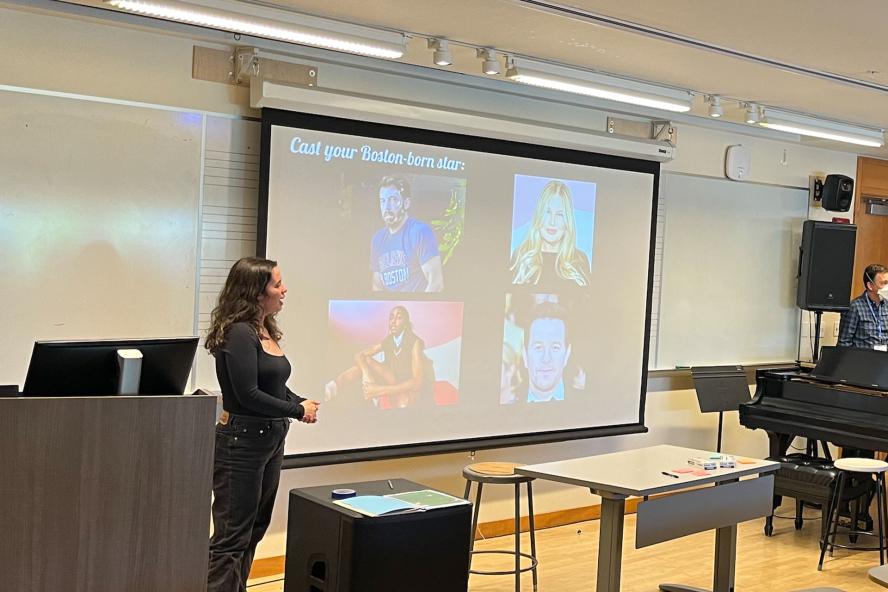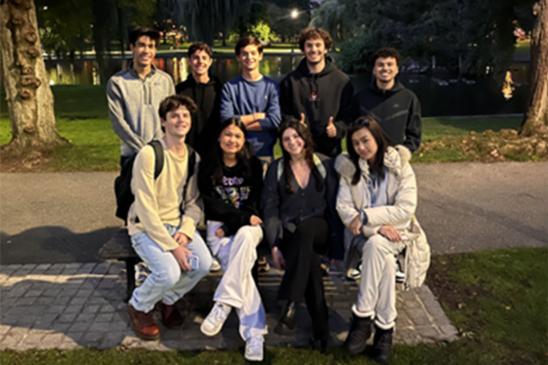Instructor Spotlight: Isabel Burney

Tell us about yourself and what inspired you to teach this course
I’ve always loved movies! As an art, an industry, a means for conversation and connection, all of it. Between my brief stint with architecture, inclination to travel, and research on classrooms’ physical environments, I keep coming back to a love for and fascination with the idea of space as well. Given that college is a time—and often the first time—when people choose for themselves what academic, social, and geographic environment to be in, “Boston in Film and Television” seemed like the perfect subject for a first-year Explorations course as students seek connections and expand and redefine their sense of home.
Do you have a favorite depiction of Boston in a TV show or film?
Good Will Hunting comes to mind as a classic, of course. There’s an endearingly proud, almost childlike affection for Boston and its people that beats from the heart of that movie that never gets old. I also love Manchester by the Sea for its delicate attention to some gorgeous Massachusetts landscapes and its resilient streak of humor that very much speaks to the enduring love, community, and good-humored spirit I’ve experienced in Boston.
What are some stereotypes that are present when Boston is represented in film? What does this tell us about peoples’ perceptions of Boston?
A lot of Southie accents. A lot of “Boston movies” are crime movies that emphasize a gritty but still humorous, largely white Irish Catholic heritage. These depictions can resonate more charmingly with external perceptions of Boston than with those from here, but there is an element of pride in them as well. Many Bostonian celebrities reflect similar patterns; while there's a lot of buzz around the Matt Damons, Ben and Casey Afflecks, Mark Wahlbergs, and Conan O’Briens of the world, they are not Boston’s whole story. The “typical” personas people and industries rally around can tell us a lot about where cultural power is located. An important consideration of our class is how to reconcile any affection we may hold for this iconography with an interrogation of its role in sidelining other experiences, identities, and more untold stories.
What do you hope that students will take away from your course?
I took an Explorations course with the ExCollege my freshman year and loved the sense of creativity, community, and meaning that it brought to academia. There can be lightheartedness and joy in serious intellectual pursuits, and I am so excited to have a hand in creating these experiences for other students! I hope they leave enthusiastic about their chosen home for the next four years and ready to intentionally engage with the Tufts and surrounding communities, thinking critically about their place in higher education and the world. I hope their appreciation for movies expands to see them as culturally and academically meaningful pieces with which to practice interdisciplinary and critical thinking skills that will serve them throughout college and beyond.
What is something you are looking forward to in your course later in the semester?
Their final project is a short film characterizing Tufts as they have experienced it so far, and we’re going to have a little celebratory class film festival to screen them in our last week—I can’t wait to see how they keep growing closer to their peers as it progresses and what they end up putting together.
Isabel Burney (she/her) is a senior studying Film & Media Studies and Sociology with a minor in Child Study and Human Development. She is originally from Ottawa, Canada, and was raised in Sammamish, Washington.
